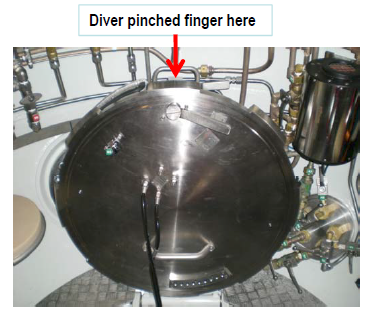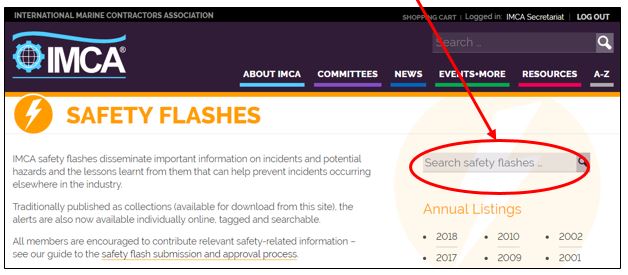Finger injury: diver caught finger in bell door
What happened?
A diver suffered an injury when his finger got caught between the top of the bell door and the retaining latch. The incident occurred at the end of the dive, when both divers had been recovered to the bell and were preparing for return to surface. The dive team were attempting to close the bell door; however, the racked umbilical was stopping the door from fully closing. Diver 1 placed his hand on top of the door and leant onto it to steady himself as he tried to reposition the umbilical. At that point, the door moved back slightly, pinching his finger between the top of the door and the retaining latch. He suffered a deep cut to his finger which lead to him being decompressed from the system as a precaution against possible infection.

What went wrong?
The investigation for this incident highlighted a number of contributory factors:
- Incorrectly stored umbilical interfering with the closing of the bell door;
- Lack of awareness/perception of risk;
- Lack of hazard markings on the pinch point location.
What actions were taken? What lessons were learned?
- There needs to be a thorough check of work areas for potential pinch points, and where these cannot be removed, ensure that they are physically highlighted and identified in task risk assessments (TRAs), and communicated to all personnel during toolbox talks (TBTs);
- There was a review of equipment stowage in the bell, which resulted in the repositioning of the bell scrubber, improved stowage of rebreather and repositioning of divers’ seats within the bell.
Incidents relating to the failure of bell door components have not been included here. Please see https://www.imca-int.com/alerts/search-safety-flash/?swpquery=hand+pinch for a wider and deeper selection of incidents relating to pinch points and hands. Please remember that safety flashes can be searched for any word. Browse to https://www.imca-int.com/alerts/safety-flash/ and type here:

Safety Event
Published: 9 November 2018
Download: IMCA SF 25/18
IMCA Safety Flashes
Submit a Report
IMCA Safety Flashes summarise key safety matters and incidents, allowing lessons to be more easily learnt for the benefit of all. The effectiveness of the IMCA Safety Flash system depends on Members sharing information and so avoiding repeat incidents. Please consider adding safetyreports@imca-int.com to your internal distribution list for safety alerts or manually submitting information on incidents you consider may be relevant. All information is anonymised or sanitised, as appropriate.
IMCA’s store terms and conditions (https://www.imca-int.com/legal-notices/terms/) apply to all downloads from IMCA’s website, including this document.
IMCA makes every effort to ensure the accuracy and reliability of the data contained in the documents it publishes, but IMCA shall not be liable for any guidance and/or recommendation and/or statement herein contained. The information contained in this document does not fulfil or replace any individual’s or Member's legal, regulatory or other duties or obligations in respect of their operations. Individuals and Members remain solely responsible for the safe, lawful and proper conduct of their operations.
